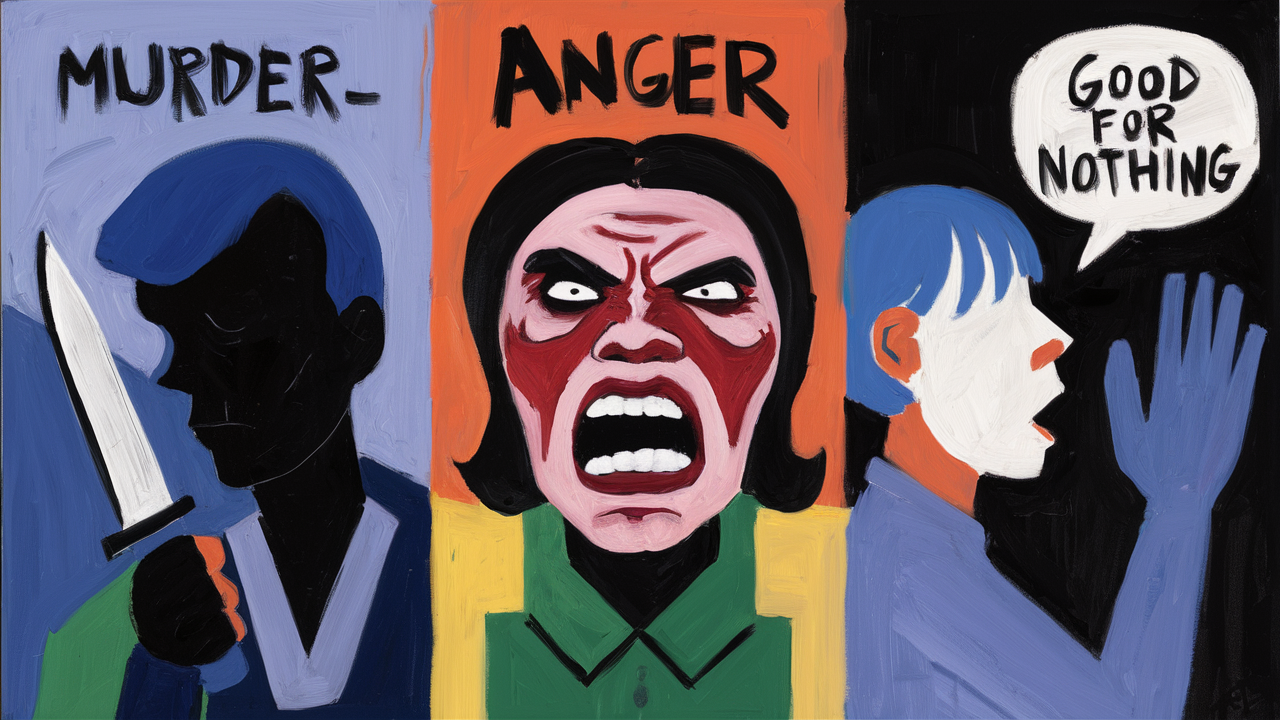I had a lot of fun generating the cover images for this blog post. Here is another one that didn't quite make the cut but I don't want to ignore:

I was listening to an episode of the Bible Project Podcast: How Is Anger the Same as Murder? where they discussed Jesus's reference to Gehenna (γέενναν) in Matthew 5:22 and they kind of blew my mind.

Matthew 5:21–22 (NIV)
'You have heard that it was said to the people long ago, "You shall not murder, and anyone who murders will be subject to judgment." But I tell you that anyone who is angry with a brother or sister will be subject to judgment. Again, anyone who says to a brother or sister, "Raca," is answerable to the court. And anyone who says, "You fool!" will be in danger of the fire of hell.'
The Bible Project has produced their own translation of the Sermon on the Mount.
Matthew 5:21–22 (Bible Project Translation)
You have heard that it was said to the ancients, "You will not murder" and "Whoever murders will be guilty by the court."And I say to you that anyone who is angry with his brother will be guilty by the court;and whoever calls his brother "good for nothing!" will be guilty by the Sanhedrin and whoever says "fool!" will be guilty of the fire of gehenna.
What blew my mind was what this word gehenna, almost universally translated as hell, means (I checked about 10 translations and they all had some variation of hell or hellfire). This word pops up 12 times in the New Testament, seven times in Matthew, three times in Mark, once in Luke, and once in James) and it's always translated hell. But, as Tim alluded to with a pretty convincing argument, it probably doesn't actually mean hell.
There is one common interpretation of gehenna, which is that it was a rubbish tip outside of Jerusalem where people would burn their rubbish – this is the interpretation that I've heard over and over again. But, the only evidence we have for this apparently comes from Medieval times and so it probably wasn't a rubbish dump in Jesus's day. There is a much more likely meaning for gehenna that Jesus could have been referring to.

Pocket Dictionary of Biblical Studies (Patzia & Petrotta, 2002)
The 'valley of Hinnom'[gehenna], a ravine southwest of Jerusalem that connects with the Kidron Valley, as well as an image of destruction of the wicked. In the OT we learn that it was a place where children were sacrificed and burned to the god Molech (2 Kings 23:10; 2 Chron 28:3; 33:6), but it was also a site where dead animals and garbage were burned. In the NT geenna it is a graphic image of the punishment and destruction of the wicked (Mt 5:22; 10:28; 23:33; Mk 9:43–47; cf. Is 66:24) and thus is frequently translated into English as “hell.”
This little article references both explanations: it was 'a place where children were sacrificed' and it was 'a site where dead animals and garbage were burned'.

The Eerdmans Bible Dictionary (Myers 1987)
In the Hellenistic period the name came to be used metaphorically to denote final punishment by fire, and thus came to be the New Testament name for the place of eternal torment for unbelievers.
The assertion that, in New Testament times, 'the name came to be used metaphorically to denote final punishment by fire' is what Tim seemed to be challenging in this podcast and I'm pretty excited to learn more about it.
During my brief time set aside for writing this morning, I tried to find anything in my library that would succinctly describe Tim's point, but I couldn't find anything. Tim's point was that the leaders who sacrificed children by burning them alive in this valley would themselves be burnt alive. It's an instance of a reversal style of punishment.
Tim Mackie
So the idea here is that the fires of this valley were lit by people, but that God would respond to that grave injustice by bringing justice. The person who digs a pit will fall into it, as in the Proverbs or measure eye for eye, tooth for tooth. So the fires that these leaders lit in Gehenna will be turned back upon them, so to speak, and they will meet their doom in that same valley where they took the lives of others.
If this is true, it changes the tone of this passage (and some other significant passages in the NT as well) where it stops being about God throwing people onto this giant rubbish pile and burning them alive and instead becomes about bringing justice onto people based on their own deeds. I can't wrap my head around all the implications this might have – it brings a completely different flavour to this text at least.
Tim refers to a book called The Fate of the Dead by Richard Baukham, which of course I couldn't read in the hour I had for writing this post this morning. I couldn't find anything that succinctly captured the idea that Gehenna wouldn't literally mean fire for everyone, but instead revisiting one's own sins as a form of justice, so that'll have to be a thread that I leave hanging (which I somehow have to be okay with).

